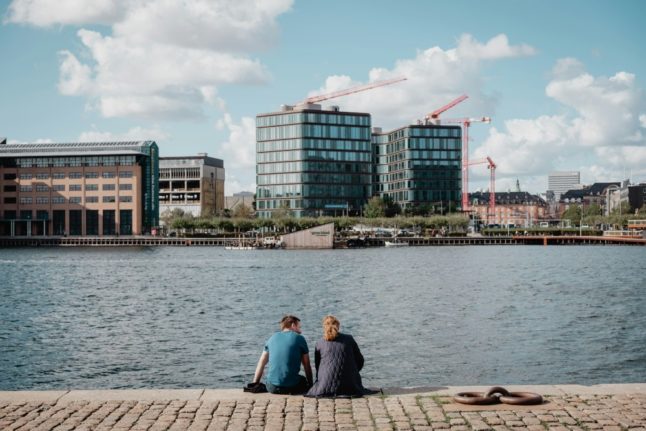Editor’s note: Article updated on March 2nd, 2023 to include comments from SIRI.
Ramesh Subedi, from Nepal, was hired as kitchen manager at the Klubben restaurant in Copenhagen, after studying business administration at Roskilde University. But the Danish Agency for International Recruitment and Integration (SIRI), rejected his application for a work permit.
The rejection and Subedi’s appeal has become a high-profile work permit case in Denmark, with the Politiken newspaper among Danish media to have written about his situation.
Siri rejected Subedi on the basis of formodning, which translates to “presumption” or “suspicion”, meaning the case officer thought the salary he was being offered, which met the 448,000 kroner per year minimum for the Pay Limit Scheme, was unrealistically high based on the position in question and his qualifications.
The Pay Limit scheme allows work permits to be granted to applicants who have been offered a salary above a government-set amount by a Danish employer.
When The Local spoke to Subedi, he said life had been difficult since the rejection, as he was forbidden from working and had been forced to move out of his apartment as his rental contract was linked to his visa.
“It’s really hard to live here in Denmark without working. It’s already been three months,” he said.
Subedi, his pregnant wife and three-year-old son are now at risk of becoming homeless as they are unable to rent a new apartment without a salary.
“We are borrowing [an apartment] from relatives and they are on holiday. So we are living in their apartment, but they are coming back,” he said. “If we [apply] for an apartment they [landlords or housing associations, ed.] ask me to show my salary for the agreement, but I can’t work so I can’t show them the salary.”
He said his treatment by the Danish authorities had been “disappointing”, and had had an effect on his pre-school age son, who was born in Denmark in 2019 and has not lived in any other country.
“It’s really hard. My son is three years old and he goes to kindergarten. He’s really happy to go there and it’s really disappointing,” he said. “Without working it’s really hard to live here and my wife is pregnant and taking psychiatric help with these things.”
What he found frustrating, he said, was the way his case had been decided without anyone speaking to him in person.
“I hope they will have another look at the case and [that I can have] a meeting with them so they can see we are working in a good way. So I really hope they will look at the case again and allow us to stay on,” he said.
Subedi’s lawyer, Anders Boelskifte, complained that no one from SIRI had visited the restaurant or interviewed Subedi before deciding on the case, and said the agency had no real backing for the presumption that Subedi’s salary had been set artificially high.
READ ALSO: Denmark set to permanently ease work permit rule as bill reaches parliament
“They accuse [the restaurant owner] of doing something illegal in order to give him a legal basis for staying,” he said.
But Subedi’s predecessor in the role of kitchen manager, he pointed out, had received an even higher salary. He also argued that Subedi was very difficult for the restaurant to replace, increasing his value to the business.
“But when you’re losing an employee, you also have [to ask] what is the value for you? What can you get instead? Can you get someone to replace him?,” he said.
He said that he also had evidence that another non-EU national with a comparable qualification background, salary and position to Subedi’s had been approved under the Pay Limit Scheme.
“SIRI has to review this case. They have to review it because this is new information of importance,” he said.
If SIRI had any suspicions about the veracity of the salary, he continued, the agency could simply have checked Subedi’s bank account to make sure he was genuinely being paid the sums that Klubben claimed.
“SIRI has full power to go into the bank account of the applicant and check what is coming in. They can see that and then after one month, two months, five months then say, ‘okay, does it fit with the figures you mentioned to us?’. They can say ‘okay, then you get the permission’,” he said.
SIRI told The Local in a written statement that it assesses in Pay Limit Scheme applications “whether there is a certain suspicion that it is not a case of genuine employment or that the purpose is solely to obtain residence in this country which the alien would otherwise not be able to obtain.”
“In such cases, the application is rejected,” the agency wrote.
The “formodningsafslag” law, introduced in January 2021, was introduced to prevent abuse of the Pay Limit Scheme, particularly in cases where restaurants hired Chinese chefs, SIRI said.
READ ALSO: Explained: How Danish visa laws may have been misused to exploit Chinese chefs
The law allows SIRI to reject applications that fulfil the regular criteria related to salary and employment terms “if there is a certain suspicion that the factual employment circumstances do not fit with those outlined in the application,” it continued.
These can include a “certain suspicion” (vis formodning) related to the applicant’s education and employment history, previous applications for Danish residence permits and the salaries considered to be normal for the business and sector in question, it said.
“We always conduct a concrete and individual assessment of the relevant information of the case,” SIRI wrote.
“In the legal descriptions there is no suggestion that a labour shortage or domestic difficulties acquiring in-demand labour can be seen as a criteria in the assessment of whether a job offer is genuine,” it stated.
In a written response earlier provided to Politiken, SIRI said with specific reference to Subedi’s case that it had deemed his educational background to be unrelated to his duties at the restaurant and his experience in the sector to be relatively limited.
Boelskifte initially contacted the parliamentary ombudsman to file a complaint about how the application had been processed but was told that the ombudsman could not address the complaint until it had made its way through the lower appeal system via Udlændingenævnet, the Immigration Appeals Board.
Even convincing SIRI to stay Subedi’s deportation until his wife had given birth had been difficult, he said.
“It was really stupid. It’s really crazy how many details they wanted to have about the pregnancy. But then they finally said, ‘okay, they can stay here until two months after the time of birth’,” he said.
READ ALSO: How can you get a work permit in Denmark if you are not an EU national?



 Please whitelist us to continue reading.
Please whitelist us to continue reading.
Member comments